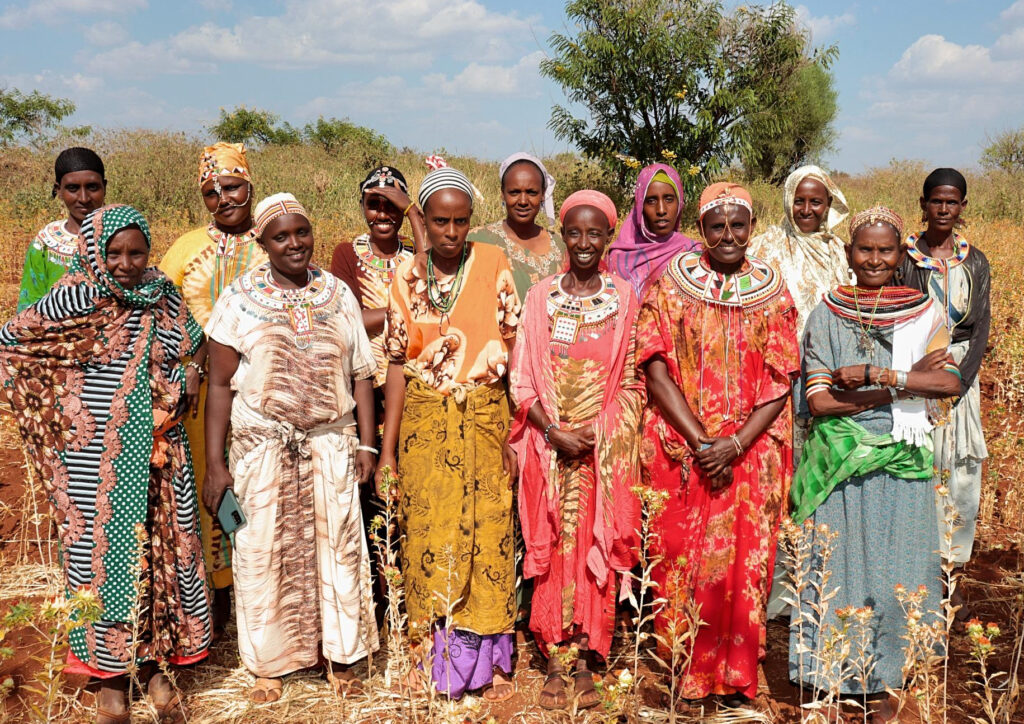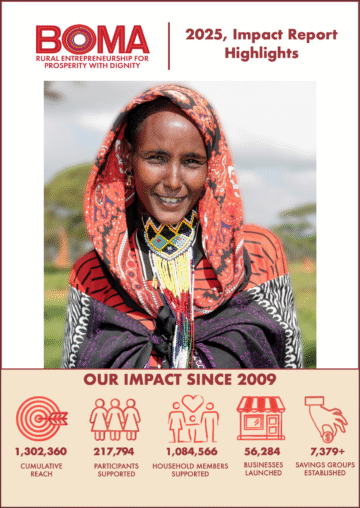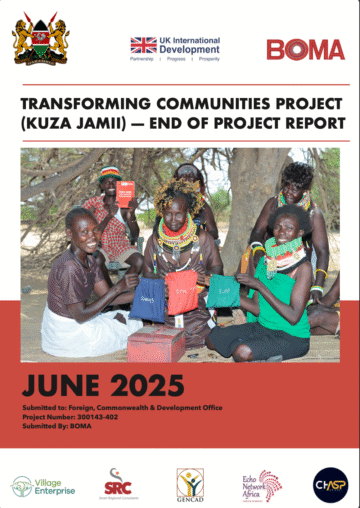
Under the sweltering sun of Songa, Marsabit, thirteen women gather beneath the shade of a nearby tree, their faces bright with enthusiasm despite the midday heat. Their laughter and animated conversations create an air of determination; one that is both inspiring and infectious. These women are members of the Isgargato Savings Group, a collective formed under the Livelihood and Inclusion for Transformation-Northern Kenya (LIFT-NK) Program.
Their name, Isgargato, means “uplifting each other,” a fitting reflection to the unity and resilience they embody. BOMA’s programs typically encourage several business groups (5-6) within close proximity to come together and form a Savings Group. These women merged five business groups into one. “We were fifteen, but two left due to security concerns in the area, especially cattle rustling,” they explain. What keeps the remaining thirteen together is their belief in transformation through collective effort.
With KES 80,000 currently in their savings box, the various business groups operate diverse businesses, including poultry farming, beekeeping, grocery sales among others. But what truly sets them apart is their bold decision to venture into sunflower farming, a unique choice in the region.
“During our market assessment training at the boot camp, we learned to identify unique and competitive opportunities,” Joyce, the group’s chairlady, explains. “Sunflower farming stood out because few people grow it here. Natural sunflower oil is in demand, and it has no artificial additives or strong odors.”
Their inspiration came from an unexpected source, the local chief. After the group observed his thriving sunflower farm, they sought his guidance. Encouraged by their enthusiasm, he not only sold them their first kilogram of sunflower seeds but also mentored them in cultivation techniques.
“Sunflowers are a safe option,” Joyce adds. “Unlike other crops, they aren’t destroyed by birds or elephants, reducing our losses. Plus, the chief was selling just one cup of sunflower oil for KES 200 (about 2 USD), a sign that this could be a profitable venture.”
Despite their determination, water scarcity remains a formidable challenge. Rainfall in the region is unreliable, and their stored water in tanks is insufficient. To make matters worse, elephants roaming the area often break water pipes in search of water, disrupting the supply to their homes.
“We are hopeful that the April rains will help our sunflowers flourish,” Joyce says. “Otherwise, irrigation would be an option, if only we had consistent access to water.”
Discipline is the backbone of their success. Every Tuesday at 8:00 AM, the group gathers to tend to the farm. They begin with a prayer, then divide tasks among themselves. Strict rules ensure accountability and latecomers are fined KES 50, and absentees (without valid reasons) pay KES 100.
Their vision extends beyond the group farm. “If this venture succeeds, we plan to have every member grow sunflowers at home, maximizing individual incomes,” Joyce shares.
Roseline adds, “This oil is completely natural, free from chemicals, and even suitable for people with high blood pressure. It can also be used on the skin; it’s that pure!”
Through LIFT-NK, the women have gained crucial knowledge beyond agriculture. Joyce highlights, “Before, we didn’t understand the importance of trees. Now, we protect them, knowing their role in the environment. We’ve also learned to make hay for livestock, ensuring they survive droughts.”
For Gumato, the training transformed her poultry business. “I now know simple but crucial things, like positioning the coop away from strong winds to prevent the chicken from getting respiratory diseases and recognizing poultry diseases early.”
Selestina reflects, “Before this program, we were poor. We knew nothing about businesses or savings. Now, we borrow loans, return them with interest, and improve our lives.”
Rosemary shares a deeply personal impact: “I borrowed a loan to pay for my daughter’s transport to school. I never had the chance to study, but I want better for her. I insist that she must get an education.”
Perhaps the most significant transformation is the empowerment of women. “The icing on the cake,” Joyce says with a smile, “is that we now have a voice. Our husbands are happy because we no longer depend on them for every little need. We contribute financially at home, and that gives us respect and leverage.”
As they gaze over their blooming sunflowers, these women see not just a crop but they also see a future filled with possibility. Their journey from ultra-poverty to economic independence is of the the power of resilience, knowledge, and collective action. With every sunflower that sways in the wind, Isgargato Savings Group is cultivating both a thriving business and a future filled with hope.
Update:
Since this story was first written, the women of Isgargato Savings Group have made significant progress. The sunflower crop was successfully harvested towards the end of last year, turning what was once hope into tangible results. Through the LIFT-NK Innovation Fund, BOMA provided the group with a sunflower oil pressing machine, enabling them to process their harvest locally and produce sunflower oil as a finished product. The group has since sold the oil within the local market, generating income from their efforts, and also set aside some for household consumption so their families could directly benefit. Encouraged by this success, the women have now planted another round of sunflower, anticipating even greater yields in the next harvest. This progress has strengthened their enterprise, increased income potential, and moved the group beyond farming into value addition.











